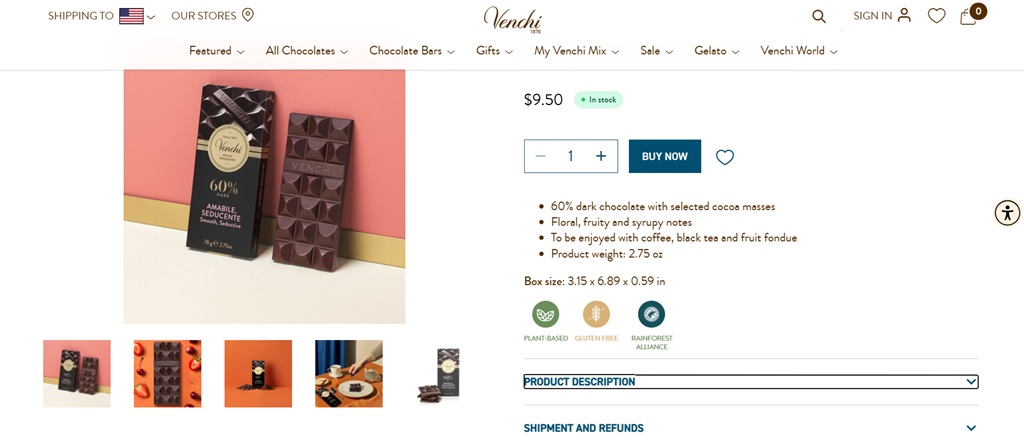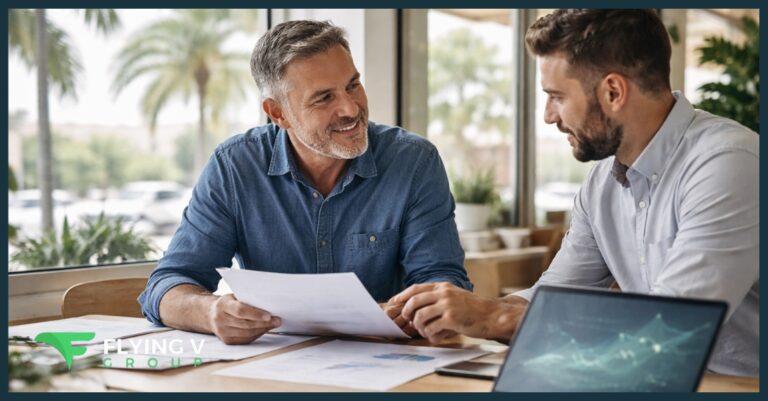Portland’s ecommerce scene is booming — from handcrafted goods in the Pearl District to eco-friendly essentials shipped out of Southeast, competition is heating up fast. But even the most beautifully designed product won’t move if customers can’t find it.
That’s why dialing in your ecommerce SEO is no longer optional. Your product pages aren’t just placeholders; they’re your first impression, your pitch, and your sales team all in one.
If they’re not showing up on Google or converting visitors into buyers, you’re leaving serious revenue on the table.
Whether you sell sustainable skincare or custom bike gear, this guide will walk you through how to optimize your product pages for both visibility and sales. Because ecommerce SEO in Portland isn’t just about rankings.
It’s about getting found by the right people and turning that traffic into growth.
Let’s jump in.
- Why Portland Ecommerce Businesses Can’t Ignore SEO
- The Anatomy of a High-Converting Product Page
- 1. Keyword-Optimized Titles and Meta Descriptions
- 2. Clean, Descriptive URLs
- 3. Persuasive Product Descriptions
- 4. High-Quality Images with Alt Text
- 5. Trust Signals and Social Proof
- Local SEO Tactics for Portland-Based Ecommerce Stores
- 1. Set Up and Optimize Your Google Business Profile
- 2. Add Local Schema Markup to Product Pages
- 3. Use Portland-Specific Keywords
- 4. Earn Local Backlinks
- Site Speed, Mobile Optimization & UX: Why It Matters in Portland
- Tracking & Improving Product Page Performance
- How to Get Your Ecommerce Business Cited in AI Search
- Let’s Turn Your Ecommerce Site Into a Sales Powerhouse
- Frequently Asked Questions
Why Portland Ecommerce Businesses Can’t Ignore SEO
Portland shoppers value local, sustainable, and purpose-driven products. And your ecommerce store isn’t just competing with big-box retailers, but also local brands fighting for attention.
Paid ads can offer a short-term boost, but they’re costly and vanish when the budget ends. SEO, on the other hand, keeps working around the clock.
With well-optimized product pages, you attract high-intent Portland buyers consistently.
By investing in ecommerce SEO tailored to Portland, you’re not just chasing clicks. You’re building long-term visibility, credibility, and conversions.
The Anatomy of a High-Converting Product Page
Your product page isn’t just a place to drop a photo and a price.
It’s where decisions are made.
If you’re serious about ecommerce SEO in Portland, every element of your product page needs to pull its weight from how it ranks in Google to how well it persuades someone to hit “Add to Cart.”
Here’s what you need to get right:
1. Keyword-Optimized Titles and Meta Descriptions
Don’t just use generic product names. Include keywords people are searching for, especially ones with Portland intent. Instead of “Organic Soap,” go for something like “Organic Lavender Soap – Handmade in Portland.”
Write meta descriptions that speak to benefits, not just features. Keep it concise, but make people want to click.
2. Clean, Descriptive URLs
URLs should be short, readable, and include relevant keywords.
Good: https://www.yourstore.com/portland-honey-lip-balm
Bad: https://www.yourstore.com/product-13579
Google and your users both prefer clarity.
3. Persuasive Product Descriptions
Don’t settle for manufacturer descriptions. Write original copy that speaks to your ideal Portland customer, someone who cares about craftsmanship, sustainability, and community.
Tell a story. Where’s it made? What inspired it? Why is it better? Use sensory language and make it emotional.
At Flying V Group, we’ve copywriting experts who know how you write persuasive copies that convert.
4. High-Quality Images with Alt Text
Use crisp, well-lit photos from multiple angles. Show the product in real-life settings, especially if it ties into Portland culture or lifestyle.
Alt text is often overlooked but matters for both SEO and accessibility. Describe what’s in the photo with keywords when relevant.
5. Trust Signals and Social Proof
Show customer reviews, ratings, and any local recognition you’ve earned (like “featured at the Portland Saturday Market” or “top-rated on Yelp Portland”).
Add icons or badges that indicate fast shipping, easy returns, or “Portland made.” These subtle elements reduce hesitation and build confidence.
Local SEO Tactics for Portland-Based Ecommerce Stores
Even if your store is 100% online, local SEO still matters. Showing up in local searches builds trust, attracts nearby customers, and helps you tap into Portland’s tight-knit online shopping culture.
Here’s how to localize your ecommerce SEO strategy:
1. Set Up and Optimize Your Google Business Profile
If you offer local pickup, in-person services, or even just want to show up in local results, a Google Business Profile is essential.
Use your actual business address, add relevant categories, upload photos, and keep your hours accurate. Encourage local customers to leave reviews. They influence both rankings and buyer confidence.
2. Add Local Schema Markup to Product Pages
Schema helps search engines understand your content. Use LocalBusiness schema alongside the Product schema to indicate that your business is based in Portland.
This increases your chance of appearing in rich results or even AI-driven answers.
3. Use Portland-Specific Keywords
Go beyond generic phrases. Add terms like “handmade in Portland,” “ships from SE Portland,” or “available near Alberta Arts District” to your product descriptions and metadata.
These modifiers can help you show up in hyper-local searches and connect with customers who want to support businesses in their neighborhood.
Use keyword research tools like Semrush to find relevant keywords that people are searching for.
4. Earn Local Backlinks
Links from Portland-based websites boost both your authority and local relevance. Target sources like:
- Local directories (Travel Portland, Portland Business Journal listings)
- Influencer collaborations with Portland bloggers or micro-creators
- Guest posts or features on community blogs or eco-living sites
Site Speed, Mobile Optimization & UX: Why It Matters in Portland
If your ecommerce site is slow or confusing, you’re losing customers before they even see your products
1. Prioritize Speed
A slow website = lost revenue. Google favors fast-loading pages, and users bounce quickly when things lag.
Use tools like Google PageSpeed Insights or GTmetrix to identify what’s dragging your site down, like oversized images, unnecessary plugins, or poor hosting.
Aim for a load time under 3 seconds. Every second faster increases your chances of conversion.
2. Make It Mobile-First
Over half of all online shopping happens on mobile.
Your product pages must be fully responsive, easy to navigate, and visually clean on small screens.
Test everything on mobile: images, text sizes, buttons, checkout flow. If something feels clunky on your phone, your customers will feel it too.
You need to provide your users with a seamless experience.
3. Smooth, Minimalist UX
Customers value efficiency and experience. Avoid overwhelming them with pop-ups, endless tabs, or slow-loading animations.
Keep product pages focused:
- One clear CTA (Add to Cart, Buy Now)
- Easy-to-scan layout
- Simple navigation
- Visible trust badges and shipping info
You can see an example from Venchi.

Tracking & Improving Product Page Performance
To keep your product pages converting, you need to track what’s working and fix what’s not.
Use Google Analytics & Search Console
Analytics shows how visitors behave. Search Console reveals your rankings and click-through rates.
Together, they highlight underperforming pages and missed keyword opportunities.
Focus On These Metrics
Here are some metrics you need to track.
- Bounce rate
- Conversion rate
- Add-to-cart rate
- Organic traffic
A high bounce rate? Slow load times or weak content might be the issue.
You figure that out, you need an expert like Flying V Group.
How to Get Your Ecommerce Business Cited in AI Search

and Google’s AI Overviews are starting to answer questions directly, often without showing traditional search results.
Generative Engine Optimization (GEO) helps your product pages get picked up by these AI-driven platforms. It’s about making your content not just rankable, but recommended in AI answers.
Some actionable tips to get cited by ChatGPT and other AI platforms.
1. Publish Expert-Level Content
AI models favor accurate, well-structured information.
- Create long-form product guides, FAQs, or comparison posts.
- Add original insights or expert advice related to your niche.
🛒 Example: “The Complete Guide to Sustainable Skincare in Portland”
2. Earn Backlinks from Authoritative Sites
AI tools reference content that’s already cited elsewhere.
- Get featured on local Portland blogs, news sites, or directories.
- Partner with influencers or get coverage from niche publications.
3. Use Clear, Structured Formatting
AI parses content better when it’s organized.
- Use headings, bullet points, and schema markup.
- Add FAQs (these often show up in AI answers).
4. Optimize for Branded Mentions
ChatGPT and Perplexity often pull brand names directly.
Make sure your business name appears consistently across your website, Google Business Profile, and directories.
5. Be Active Where AI Trains
Platforms like Perplexity cite recent web content.
- Post regularly on Reddit, Medium, LinkedIn, or niche forums where discussions get indexed.
- Keep your blog updated, especially with local or trending topics.
Let’s Turn Your Ecommerce Site Into a Sales Powerhouse
If you’re an ecommerce business in Portland, your product pages are more than just digital shelves.
They’re the engine behind your growth. When optimized the right way, they don’t just attract traffic. They convert browsers into loyal buyers.
From local SEO tactics and mobile UX to future-forward strategies like Generative Engine Optimization (GEO), there’s never been a better time to invest in sustainable, long-term visibility.
But doing it right takes more than plugins and guesswork. It takes strategy.
Flying V Group is helping brands get more customers through SEO and GEO.
Let’s talk and turn your ecommerce site into a high-performing, search-dominating, revenue-driving machine.
Frequently Asked Questions
1. What is ecommerce SEO?
Ecommerce SEO is the process of optimizing your online store to improve visibility in search engine results. It helps your product pages rank higher, attract more organic traffic, and drive conversions without relying on paid ads.
2. How can ecommerce SEO in Portland help my online store grow?
Ecommerce SEO in Portland helps your store rank higher in search results, attract local and national traffic, and convert visitors into customers.
With optimized product pages, technical improvements, and content tailored to Portland buyers, your store becomes more discoverable and profitable.
3. Is a Google Business Profile useful for ecommerce stores?
Yes. If you offer local pickup, delivery, or operate from a physical location or showroom in Portland. A complete Google Business Profile helps your store appear in local search results, Google Maps, and the local pack.
It also builds trust through reviews, photos, and verified business info that local customers rely on.
4. Can local SEO help Portland ecommerce stores compete with bigger brands?
Yes. Local SEO helps smaller Portland ecommerce stores gain visibility in searches that big brands often overlook.
By targeting Portland-specific keywords, earning local backlinks, and creating location-relevant content, you can connect with nearby shoppers, appear in local search results, and build trust, giving you a real edge over national competitors.








0 Comments